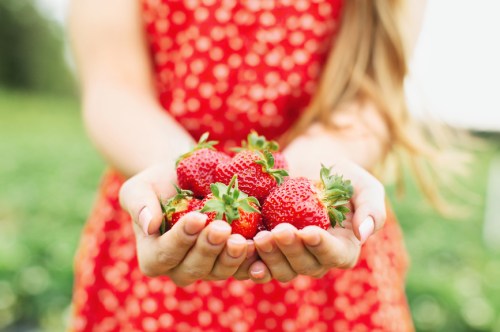Are In-Season Fruits and Veggies Really Any Richer in Nutrients Compared to Out-of-Season Produce?
Here, a registered dietitian shares whether or not seasonal produce is any healthier than out-of-season fruits and veggies.

Fact: A globalized food market means that many varieties of fruits and vegetables are imported from around the world and are available for purchase at the grocery store year-round. A privilege, no? But there are many sound reasons to seek out produce that is in-season right now in your neck of the woods, starting with the yumminess factor. In-season, locally-grown fruits and veggies are usually harvested at peak ripeness, which means they are much more flavorful. And not only will your taste buds thank you, but buying local, seasonal produce also eases the environmental impact that comes with transportation.
Experts in This Article
And if those are not compelling reasons to shop local when it comes to produce, there’s another benefit to planning your meals around in-season fruits and vegetables. Because they are picked at peak ripeness when nutrient content is at its highest, produce that’s in-season tends to be slightly richer in antioxidant vitamins, minerals, and phytochemicals than out-of-season produce, according to Sara Riehm, RD, a registered dietician at Orlando Health.
“Fruits and vegetables tend to be the most nutrient-dense right after they’re harvested, when they’re at that peak ripeness, which is part of why seasonal produce tastes better,” says Riehm.
Conversely, produce that is destined to be shipped over long distances may not be harvested at peak ripeness, which affects both the flavor and the nutrient content. The time it takes for fruits and vegetables to get from the farm to your plate also affects the nutritional value of produce, as the vitamins and minerals deteriorate over time, Riehm explains.
“[Fruits and vegetables] still need to be grown in the climate that’s required,” says Riehm. “If they are being transported, oftentimes they’re not picked at their peak ripeness because they’re going to ripen a little bit during transport. Because of that, and because so much time passes between when the food is harvested to when it gets to our grocery store or our farmers market and we eat it, some of those nutrients are going to degrade a little bit.”
So, what in-season produce should you keep an eye out for as we settle into the summer months? Great question.
“Bell peppers, specifically red bell peppers, tend to ripen later on in the summer, and those are a really great source of vitamin C,” says Riehm. “Blueberries, raspberries, blackberries, and strawberries are also in-season during the summer, as are peaches, nectarines, and plums. So those are some good fruits and vegetables to look out for right now.”
Nonetheless, Riehm emphasizes that the difference in the nutrient content of in-season compared to out-of-season fruit is minimal, and that fresh fruits and vegetables, many of which are rich in fiber and antioxidants, are always worth consuming, even if they are not in season.
“Consuming a variety of fruits and vegetables year-round is so important, regardless of whether they’re in season or out of season. But ideally, we would be consuming them in-season because that’s when they’re the most nutrient dense,” says Riehm. “Keep in mind that it’s not a very significant degradation to where it reaches anything close to warranting, ‘Oh, it’s you know, strawberries are out of season so I should not consume them at all.’”
What better way to use your in-season strawberries than in this delicious strawberry and quinoa breakfast parfait?
Sign Up for Our Daily Newsletter
Get all the latest in wellness, trends, food, fitness, beauty, and more delivered right to your inbox.
Got it, you've been added to our email list.










